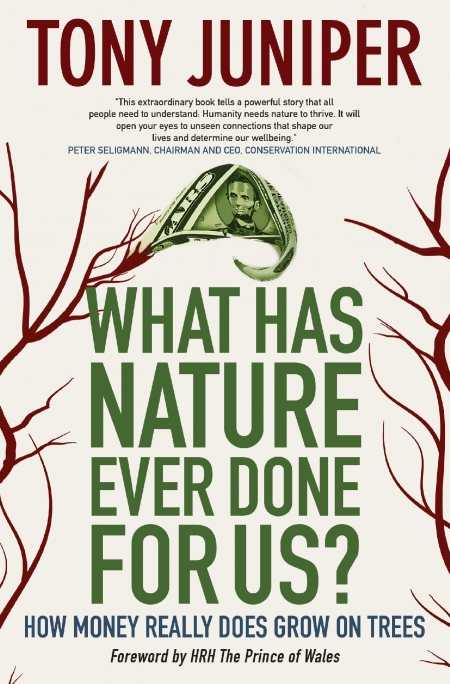What Has Nature Ever Done For Us?
How Money Really Does Grow on Trees
- 2013 INDIES Finalist
- Finalist, Ecology & Environment (Adult Nonfiction)
This manifesto about the economic value of nature’s services to humans and the Earth is sure to provoke much thought and discussion.
Tony Juniper likes to ask provocative questions about the world we inhabit. A prominent environmentalist, he authored the book How Many Light Bulbs Does It Take to Change a Planet? (Quercus, 2008). His current work, What Has Nature Ever Done for Us? How Money Really Does Grow on Trees, presents an even more intriguing question— and it is likely no one can answer it quite like Juniper.
This wide-ranging study considers such aspects of nature as the essential components of dirt, the importance of light to living things, the enormous impact of both plant and animal pollinators, the precious qualities of water, and the remarkably rich harvest provided by Earth’s oceans. What Juniper does, however, is continuously tie nature’s “services” back to their economic value.
To introduce each chapter, he includes factoids quantifying dollar amounts that can be associated with nature. For example:
Chapter 3: Eco-innovation—“25–50 Percent: Proportion of $640 billion pharmaceutical market based on natural genetic diversity.”
Chapter 8: Ocean Planet—“$21 Trillion: Annual economic value provided by the oceans.“
In addition, the author tells a compelling story in each chapter that draws attention to a particular natural occurrence or challenge. In one of the more-startling chapter openings, Juniper paints a picture of events that were occurring in 1975 (the end of the Vietnam War and the birth of Microsoft, for example) to make this point: “But perhaps the most significant landmark was that it seems this was the year when rising human demands on the Earth’s natural systems exceeded what Nature could indefinitely supply.”
Juniper is both an educator and a commentator, and he expresses himself in words that demand attention. About dirt, he writes, “Beneath our feet, out of sight and often out of mind, soil is probably the least appreciated source of human welfare and security.”
He also shares unique information that could have a significant impact on the health of humans; for example: “The venom of a Central American bark scorpion is being studied for the role it might play in improving the success of heart bypass operations.” It is Juniper’s command of remarkable facts and ability to dramatize economic implications that turn what could have been a basic study of nature and the world’s environment into extraordinarily interesting reading.
In the end, what Juniper hopes to accomplish with this finely written work is to make the public aware that nature has a “vital economic value” that cannot be taken for granted. The author eloquently answers the question the book’s title poses, presenting an impassioned case for humankind to develop a much better relationship with nature. This is a book that deserves the most serious consideration by all readers.
Reviewed by
Barry Silverstein
Disclosure: This article is not an endorsement, but a review. The publisher of this book provided free copies of the book and paid a small fee to have their book reviewed by a professional reviewer. Foreword Reviews and Clarion Reviews make no guarantee that the publisher will receive a positive review. Foreword Magazine, Inc. is disclosing this in accordance with the Federal Trade Commission’s 16 CFR, Part 255.

